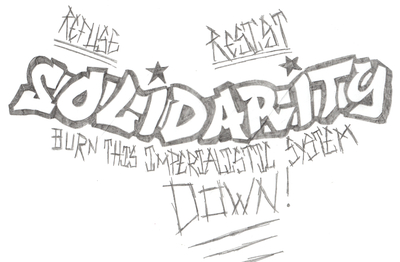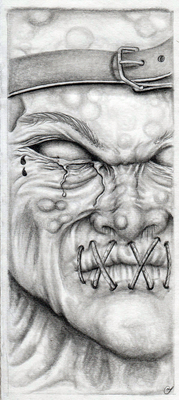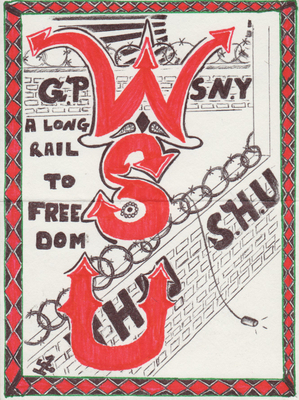“Everyone should know by now that prison is politics, it is part of the
imperialistic policy of exploitation, oppression and domination over the
internal colonies.” From “Who are the Political Prisoners?,” MIM Theory
11: Amerikkan Prisons On Trial
The pigs at Ironwood State Prison are at it again. Bored with the
apparent lack of excitement and disturbances at this relatively peaceful
and quiet yard, they have decided to manufacture their own entertainment
to the detriment of the imprisoned. Within the span of two short days
the pigs here have decided to raid people’s houses without any kind of
factual proof but only unfounded allegations from “anonymous” sources
and supposed “snitches.” To understand the actions of the past week
however I must first recount the actions of a couple months ago.
It all began when pigs from Ironwood’s Special Investigative Unit raided
the cell of a born-again Christian in the early hours before breakfast
because they’d supposedly received an anonymous kite stating that the
Christian was going to stab a Corrections Officer. The Christian was
taken to the hole pending investigation and everyone here was left
somewhat surprised at this news, as everyone who knew this guy knew that
he’d long since left the lumpen lifestyle behind and was only concerned
with helping people out. Anyways, after finally getting out of the hole
because the investigation turned up nothing, he confided in a couple
people that on the day he went to the hole the pigs showed him a picture
of another prisoner and asked him if he knew who this persyn was. He
lied and told them he didn’t, to which they responded, “that’s the
person who told on you.”
Fast-forward to last week when two pigs unexpectedly ran to a cell and
ordered the two cellmates to step out. When they asked the pigs what
for, they were told not to worry about it and just step out. When the
prisoners refused, the pigs immediately pulled out their batons and
ordered them a third time to step out. Feeling threatened the prisoners
complied. Once in restraints and out of their cell the prisoners were
taken to the pigs’ local command post on the yard, A-Facility program
office. Once there the prisoners were stripped naked and put into
holding cages where they were accused of making wine and subsequently
treated to verbal assaults. Both prisoners denied the allegations, which
proved to be false as the pigs searched and tossed up their cell and
found nothing.
As a result the pigs had no choice but to let them go, but not before
showing them the pictures of a couple other prisoners. The pigs then
asked them if they knew who those two people were, and they said they
didn’t and were then cut loose. However, after returning to their
building they started telling everyone what had happened and that the
two prisoners who were in their building had snitched. Tension began to
rise and it looked as if people were beginning to take sides preparing
for the worst. In the end however, cooler heads prevailed and crisis was
averted between the New Afrikan and Chican@ population, as these were
the two nations being pitted against each other by the pigs’ actions.
And even though I started out this story by saying that this is
something of a peaceful yard, at the end of the day it’s still a prison
and things happen.
The very next day almost the same scenario played out when ten or
fifteen pigs rushed another person’s cell and forced him out the same
way they done to those other prisoners the night before. Again, just as
the previous night the pigs said they were looking for wine, and just
like the night before they found nothing. As the pigs were exiting this
person’s cell however they told him to thank the prisoners who’d gotten
their cell searched the night before for their visit, thereby implying
that those prisoners were somehow responsible.
These events from last week caused me to think deeper about the pigs’
actions, as well as the prisoners’ response to them and I’d like to
discuss it here. Now, before jumping to conclusions because you took a
pig at his/her word like most who are confronted with this scenario
often do, why don’t we first stop and actually think about what’s really
going on? The real issue in the examples given above aren’t about who
supposedly snitched on who, but about the motivation that the pigs have
in exposing their supposed informants to us. Let us hypothesize that in
all the examples given above the pigs were actually telling the truth
and the people identified by them in their pictures were really
snitching, what then? Should we handle our business in keeping with
prison etiquette or do we conduct our own investigation in an effort to
get to the truth?
Instead of just smashing on the alleged rat because a pig told us to,
why not at least confront this person with the information given to us
by the pigs and ask him if it’s true before smutting him up? As a matter
of fact, since when is a pig’s word even worth anything?
You can even go further than this and tell this person exactly what the
pigs told you and if he denies it then we can offer to file some kind of
paperwork together against that very same pig. Whether it be thru your
local grievance procedure or thru the courts, put it on paper and put
the pigs on blast. This way there will be documentation which shows how
these pigs are putting the lives of prisoners at risk; either because
you mistakenly assaulted another prisoner due to a pig manipulating you
or because the person in question was really a snitch - it doesn’t
matter!
Stop blindly taking the pigs at their word and doing their bidding,
otherwise you’re just a sucker who’ll believe anything, as well as a
tool of the establishment. We should strive to create unity out of the
pigs’ attempts to divide us. Turn their divide-and-conquer tactics
against them and UNITE! These actions on our part could potentially have
a two-fold outcome beneficial to us. First, if the pigs see that we’re
no longer biting into their little games they might stop baiting us, and
secondly, if the rats know the pigs are giving them up and you’re gonna
confront them then they might think twice about telling, thereby
reducing any additional oppression of all prisoners concerned. This way
bad things can be turned into good.
I know that many reading this are probably laughing and thinking it’s a
joke, and yes to a certain degree what I’m proposing is somewhat ideal,
but the harm we keep inflicting on each other is not. The possibility of
creating a United Front becomes less viable without finding ways to
settle contradictions amongst ourselves without resorting to violence,
and we must begin somewhere.
As such, within the prison realm there are generally two different types
of social contradictions: those between ourselves and the pigs and those
among the prisoners themselves. The two are totally different in nature,
and since they are different in nature the contradictions between
ourselves and the pigs and those among the prisoners themselves should
be resolved thru different methods. In order to resolve the very many
contradictions that inevitably arise among ourselves we should look to
the methods of discussion, of criticism, of persuasion and education,
and not the methods of coercion or repression, i.e. violence. This way
we can arrive at a new unity with these unstable prison elements on a
new basis and against the real enemy.
Now, for those of you still reading this and still wondering if the
people pointed out by the pigs were really snitches, that I don’t know.
What I do know however is that one of the supposed “rats” is constantly
pushing paperwork against the pigs on a variety of issues which concern
the prisoner population. While one of the other prisoners involved
recently go this life sentence commuted to a lesser term after serving
almost twenty years; the pigs knew this and didn’t like it.
These pigs don’t care about us and it doesn’t matter to them what
inmates are “snitches” and what inmates are “solid”. To them we’re all
just prisoners and the same. Perhaps we should take that as a lesson and
start looking at each other as one.
To all those people who are really snitching, start showing some
self-respect and stop harming the people you should be working with to
unite against the pigs. If you can’t stop telling them, at least tell on
a pig and not another prisoner. For everyone else, stop being a pawn to
these pigs and at least conduct your own investigation before
erroneously labeling someone a snitch, smutting him up and getting him
or yourself hurt. You never know, next time the pigs might flash your
picture to someone and call YOU the snitch.












